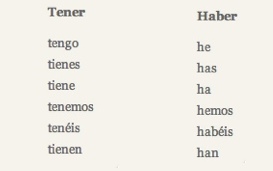All Spanish courses focus since early stages in the learning of language in how to distinguish the scary verb pair “ser” and “estar” translated in english by just one verb, “to be”, however some of other confusing pairs are often overlooked only because they are used less often.
That’s the case of verbs pairs like “pedir” and “preguntar” (to ask), “salir” y “dejar” (to leave), “tocar” y “jugar” (to play) or “haber” y “tener” (to have), which is the pair that we’ll be exploring in this post.
First of all, it’s worth mentioning that both, tener and haber are irregular.
- The difference is very clear once I explain it here.
“Tener” has the sense of ‘posses’ or ‘to hold’. For instance:
–Tengo cuatro bolsos de Luis Vuitton.
-I have four Luis Vuitton bags. (In the sense of I own / posses four really expensive bags).
In contrast, “haber” is the auxiliar verb that goes with the past participle in the perfect tenses, like here:
– He visto la última película de Nathalie Portman.
– I have seen Nathalie Portman last movie.
It’s easy up to this point?
- However both verbs, tener and haber, can also be used with “que” to express necessity and obligation.
Look at this examples:
– Tengo que comprarme una mochila.
– I have to buy a backpack.
– Hay que comprarse una mochila.
– It is necessary to buy a backpack.
In any case, you can check the differences between “hay que” and “tener que” with more detail in this post.
Note:
DELE prep A1-C2 https://mariaortegagarcia.com/info-about-dele/
Join my groups https://mariaortegagarcia.com/connect/




I’ve seen tenía planeado and había planeado. Both seem to the same. Are haber and tener interchangeable certain constructions?
Gracias por el video, su explicación fue muy fácil de entender.